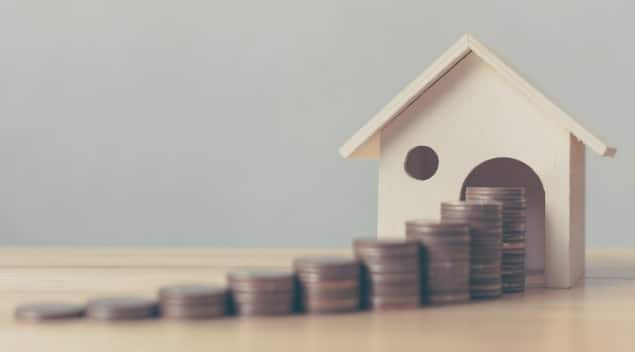
10 Ways To Save For A House Deposit [For Investors Or First Timers]
Saving for a house deposit to get onto the property investment ladder is tough. Especially with the cost of living drastically going up. After bills, rent/mortgage, groceries, petrol, insurance… there isn’t a whole lot left for saving. But that doesn’t mean it’s impossible! By adopting these 10 ways to save for a house deposit you’ll be ten steps closer to building out your portfolio and creating future wealth.
Typically, you’ll need at least a 20% deposit (an 80% loan-to-value ratio – LVR), for an investor home loan if you want to avoid paying lenders mortgage insurance (LMI). Some banks will allow you to put down a deposit smaller than 20% to buy an investment property, but you’ll need to pay LMI which adds an additional cost to your loan.
As a rule of thumb, aiming for a bigger deposit is better because it shows the lender that you’re a good saver and are able to manage your finances. There are a few banks that will allow a 5% deposit but that is usually the lowest amount they will entertain. A 5% deposit on a $500,000 loan equates to $25,000, which is far less than many prospective investors imagine their deposits will need to be.
BIGGER DEPOSIT VS SMALLER DEPOSIT
| Bigger Deposit | Smaller Deposit |
|---|---|
| Pro: Pay less in LMI | Con: Pay more in LMI |
| Con: More time spent saving while the market increases | Pro: Get into the market sooner |
| Pro: More negotiating power with the bank | Con: Fewer loan options |
| Pro: Less interest paid in total | Con: More interest paid in total |
There are also other costs you need to consider when purchasing your first investment property. These can include:
- leasing fees
- property management fees
- repairs and maintenance to ensure minimum rental standards
- body corporate fees
- tax
- loan, interest, and bank fees.
If you’re not prepared, you can easily get caught out by the costs involved in running an investment property. Where possible, a larger deposit is always preferred so that a partial amount can act as a safety buffer if needed for any hidden costs.
And now, here are the 10 ways to save for a house deposit.
1 – PAY OFF YOUR DEBT
It sounds simple enough, but you’d be surprised at the number of people drowning in crippling amounts of debt. There are two types of debt, good debt and bad debt.
What is good debt?
Good debt is money you borrow that is used to purchase something that will either grow in value or bring in an income. Such as your mortgage or a student loan. Your investment property will increase in value over time and provide you with rent. A student loan gives you opportunities in your career and increases your earning potential.
Paying off good debt should still be considered when saving for a house deposit, however your main priority needs to be bad debt.
What is bad debt?
Bad debt is anything that is used to fund your lifestyle, debt that is spent on things that have no value, or that go down in value over time. Things like credit cards, car loans and holiday loans won’t leave you any better off in the long run.
With social media running rampant through society, it is common these days for you to feel like you “need” to purchase the latest and greatest in order to keep up with the trends. The “buy now, pay later” phenomenon has developed rapidly in Australia with Afterpay now being a billion dollar company. In April 2021 they notched up their 10th millionth customer. Isn’t that just terrifying?!
Services like Afterpay have made it incredibly easy for customers to access something they need or want immediately. If repayments are made on time, often little to no interest is paid. However, if repayments are not made in the agreed time period the late fees or interest can incur.
Why should you pay off your debt quickly?
People often think they’re better off paying the minimum on their loans so that they can save money for a deposit, however this is actually very counterintuitive.
The average Aussie owes $3841 on their credit card according to Canstar. If you are only making the minimum payment, almost all goes to pay the interest incurred and only a tiny fraction goes to pay the purchases you charged (the proportion depends on your credit card rules).
This means that a credit card balance of $3841 would take you almost 30 years to pay off with minimum repayments. The frightening thing is, the interest you would pay would be almost $9000!
However, in this scenario if you paid $189 per month your debt would be paid off in only two years and you’d shave off over $8000 of interest charges.
Bottom line, you can’t save for a house deposit while you have bad debt. In fact, your ability to service an investment property with loads of unsecured debt is impaired as well.
2 – GET A BUDGET
You’ve probably heard this a thousand times. It is a common misconception that budgeting is reserved for the poor. However, this couldn’t be further from the truth. The richest of the rich generally all follow a strategised budget. How do you think they became rich in the first place?
You guessed it, let’s get into budgeting!
A budget is the single most effective tool for saving money. You can use an excel spreadsheet which will cost you nothing – or you can invest in accounting or budgeting software.
The essence of budgeting is to track what’s coming in and what’s going out. Your financial situation cannot be improved if you don’t know what’s happening in your bank accounts.
If you want to go all in, try and live off of 50% of your income for one month. If you can do this, you will end up in a place where you can budget for anything. You will learn to survive only with what you have, it is in our human nature to make do and this will set you up for a future of wealth.
A more conservative budgeting tip is to follow the 50/30/20 rule which is the idea that 50% of your income goes towards your needs, (mortgage, bills) 30% of your income goes towards entertainment and 20% needs to be invested into income producing assets.
While a budget is important to have while saving for a house deposit, it will become vital once you own that investment property.
3 – SAVE CONSISTENTLY
Once all your debt is eliminated then you can begin saving. The best and easiest way to save is by adopting the “Pay yourself first” method.
Pay yourself first method
Paying yourself first means that instead of paying all your bills and saving whatever is left, the very first thing you do when your wages come in is to send a percentage of your income to your savings and investments before covering things like food, petrol, insurance etc.
It’s useful because you’re saving some of your money for your future self before it leaks somewhere you hadn’t meant it to. To make this method fool-proof it is suggested that you set up automatic withdrawals – you know…”out of sight, out of mind”, right?
4 – ADOPT A GOAL-ORIENTED MINDSET
If you’ve never set any goals before, then it is likely you bounce through life like a pinball doing what others want instead of accomplishing what is important to you. So the magic question is – what do you want?
It is very common in Australia to reach adulthood and never be asked this question. Society is designed to trick you into thinking you know what you want but most people never stop and reflect to determine their vision and mission for life.
One fundamental attribute you’ll find among the wealthy is goal setting. They know exactly what they want and they create a plan to achieve it – a plan that they relentlessly follow until it’s completed.
Here are five powerful ways to become more goal-oriented:
- Start with the end in mind and work backwards
- Get specific and then break down into sub-goals
- Get clear on your values
- Make time for inspiration
- Form goals around your strengths
5 – PRACTICE FINANCIAL DISCIPLINE
A basic definition of ‘discipline’ is to exhibit self-control and avoid impulsivities. So to apply this to your financial situation would be to control your money and avoid impulsive spending. Financial discipline is one of those things that is a lot easier said than done.
In a world full of marketing noise, where every brand is trying to sell you something it can be difficult not to splurge. If you want to save for a house deposit fast, then a great way to “turn off the noise” is to cancel all email subscriptions where their only purpose is to take your money.
If you do come across something you fancy, then institute a mandatory three-day waiting period for every buying decision, large or small. If you still want it three days later, go ahead and buy it. Chances are, though, that you won’t remember why the item appealed to you—or even what it was you thought you wanted.
Having financial discipline will serve you now while you’re trying to save for a house deposit and it will be absolutely indispensable when you start expanding your property portfolio.
6 – SELL OR REORGANISE
It’s time to cut ties. Needs and wants are two very different things that social media, large corporations and trends like to blur together. If you’re wanting to save for a house deposit fast then there are some big steps you can take to bank some extra cash without doing a bucket load of overtime.
- Sell off assets (sell that second car, boat, etc.)
- Live on one salary and save the other
- Move your savings to a high interest account (if it’s not cost prohibitive)
- Start your own side hustle
- Sell off your clutter on and offline
- Move your high interest debt to a zero interest credit card and pay it off BEFORE the introductory period expires.
- Change over to a “cash and carry” mentality. Keep your credit cards at home.
7 – SLASH YOUR BILLS
Reduce your outgoings and you’ll instantly save money. Start with the non-essentials such as subscriptions – Netflix, Disney +, Amazon Prime, Spotify etc. You do not need them all!
It is important for quality of life to still enjoy entertainment but if you want to save for a house deposit fast then you need to get creative. There are a tonne of leisure activities that are free – hikes, the beach, a walk or a bike.
Once you have eliminated those bills that you don’t need, try to find ways to reduce your essential bills. Insurance, phone and internet providers love customer loyalty and I am sure they would hate to lose you, so ring them up and see if they can do a deal for one of their longest standing customers. You never know unless you ask!
8 – GET HELP
Find one or more individuals who would be willing to buy the investment property through a joint venture. Granted you’ll split ownership, but part of something is always worth more than all of nothing!
Friends and family – even colleagues – are the obvious people you might go to if you want to form a joint venture and invest in real estate, which can come with difficulties. There are three simple rules when investing with people you know to ensure your financial (and physical!) survival. These are:
Have clear goals
Make sure everyone wants the same thing. Competing strategies will only end in disappointment and confusion, so before you decide to enter a joint venture, ensure all parties are on the same page.
Have clean documentation
Once you have agreed on a strategy, write it down, have all parties sign on and file it somewhere safe. Same goes for all of your agreements as to how much money is being invested, who owns what, who’s liable for what and what to do if something unexpected should happen. While written proof doesn’t always solve an issue, having a signed agreement never hurts.
Know your role
Be clear about what yours and everyone else’s role is and respect that position. Everyone must have an understanding of what each role entails and ensure you have the time and money to take your role on without undue stress or anxiety.
9 – CLAIM YOUR INHERITANCE EARLY
It’s not uncommon for parents to help their kids get into a property – even if it’s an investment property.
If they’re willing, your parents can gift you some of your deposit, however remember that lenders want to see that you can save money so part of the deposit needs to come from your savings which have accumulated over a period of time – typically at least three months.
10 – NURTURE A LOVE OF LEARNING
No matter how long you invest there will always be something new to learn. Adopt an attitude of openness to learning new things and you will be amazed at what will happen.
However, don’t listen to just anyone. Find people who have achieved the success you are seeking and ask them how they made it. You are the average of your five closest peers so start surrounding yourself with people that are already property investing.
People love to share what they know, so take advantage of it and ask questions!
THE RIGHT TEAM KNOWS HOW TO SAVE FOR A HOUSE DEPOSIT
A list of 10 ways to save for a house deposit is all well and good but we all know how hard it can be to stay motivated and disciplined.
The best way to stay committed is by having the right team to work with you. If you’re seeking a team of experts to help you get on the property ladder fast, then check out our free real estate investing seminars
Come along for this high value two-hour event, ask our property investment experts questions and get to know key people in the industry that can help you streamline your investing strategy and get into the property market quicker.
Recent Articles
Building a $100k Passive Income Stream Through Property: The ‘Property Stacking’ Method Explained
Discover how to build a $100K passive income stream through property using the proven Property Stacking Method. Learn the three core principles smart Australian investors are using to scale their portfolios faster — without financial stress.
Investment Property Financing – Comprehensive Guide 2023
You won’t get very far as an investor without the ability to secure credit. Understanding how to...
Ultimate Property Investment Strategy Guide 2023
Which Property Investment Strategies Will Make You Money? Building your property investment...
How to Build a Property Portfolio with $100k or Less
Starting your property investment journey can seem daunting. There’s lots to research and plenty...
How To Develop Good Financial Habits That Lead To Wealth!
Good financial habits are the basis to creating wealth. Building financial freedom is not something you learn overnight, it takes time and a foundation of solid habits that you perform day in and day out.
The 7 Plans Every Property Investor Must Know To Succeed
When it comes to property investing as the saying goes, if you don’t have a plan, then you could be planning to fail! While there are many factors we can’t control in the market, there are certain facets we can manage to give us the best possible chance of success. In this article we will help you understand the 7 plans every property investor must know.
The Truth On How Many Investment Properties You Need To Retire
Using real estate to create financial security for the future is a popular option for many Australians, however it can be tricky to know how many investment properties you need to retire to get the outcome you desire.
What Is The Best Type Of Property Investment?
When you strive to learn everything you can about investing in property, you increase your chances of creating generational wealth! The best type of property to invest in is dependent on a number of factors about the investor and their real estate strategy.
The Property Investment Basics That You Need To Know
Real estate has the potential to become your main vehicle for creating wealth, but only if you take the time to learn some crucial property investment basics to set you up for success as an investor.












